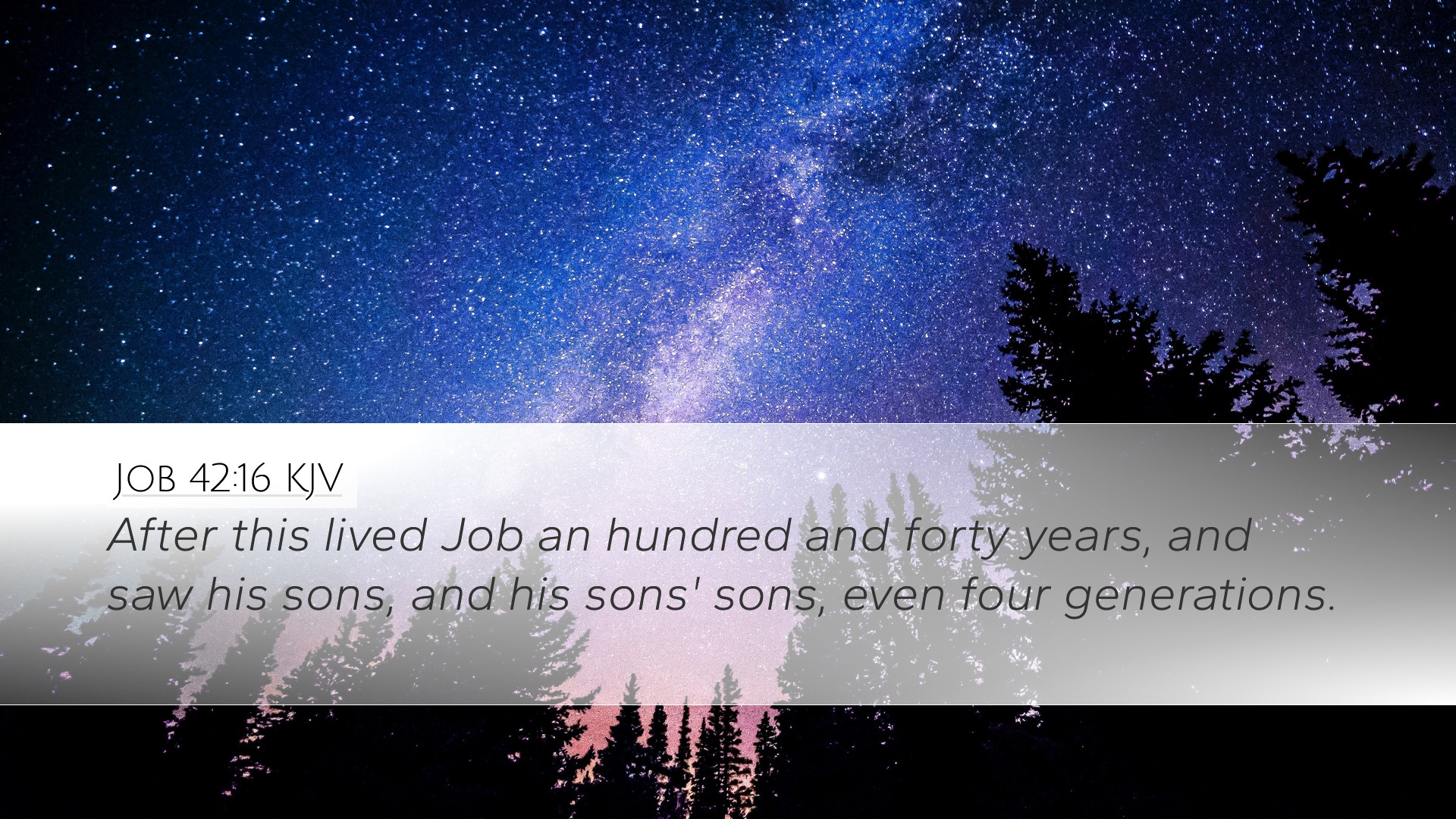Old Testament
Genesis Exodus Leviticus Numbers Deuteronomy Joshua Judges Ruth 1 Samuel 2 Samuel 1 Kings 2 Kings 1 Chronicles 2 Chronicles Ezra Nehemiah Esther Job Psalms Proverbs Ecclesiastes Song of Solomon Isaiah Jeremiah Lamentations Ezekiel Daniel Hosea Joel Amos Obadiah Jonah Micah Nahum Habakkuk Zephaniah Haggai Zechariah MalachiJob 42:16
Job 42:16 KJV
After this lived Job an hundred and forty years, and saw his sons, and his sons' sons, even four generations.
Job 42:16 Bible Commentary
Commentary on Job 42:16
Job 42:16 states: "After this, Job lived a hundred and forty years; he saw his children and their children to the fourth generation." This verse concludes the narrative of Job, marking a significant transition from suffering to restoration. In this commentary, we will delve into the insights of noted theologians and scholars, drawing from public domain resources including Matthew Henry, Albert Barnes, and Adam Clarke.
Contextual Background
The book of Job addresses the profound theme of suffering and divine providence. Job, a righteous man, endures immense suffering, losing his wealth, health, and family. This verse signifies Job's restoration and the fulfillment of God's purpose in his life. Each commentator provides a unique perspective on the implications of this restoration.
Matthew Henry's Commentary
Matthew Henry emphasizes the theme of God's mercy and restoration. He notes that Job's long life following his trials symbolizes the completeness of God’s blessings. In the context of ancient cultures, living to the age of 140 years was considered a sign of divine favor.
- Divine Restoration: Henry highlights that Job's extended life was both a reward for his faithfulness and a testament to God’s ability to restore what was lost. Through this, Henry illustrates that God's blessings often exceed our expectations.
- Generational Impact: The sight of Job seeing four generations of his descendants speaks volumes about the fruitfulness of a life lived in obedience to God. This generational blessing reinforces the idea of legacy and the long-lasting effects of righteousness.
Albert Barnes' Observations
Albert Barnes focuses on the implications of Job’s restoration, suggesting that it should serve as a source of encouragement for the faithful. He explicates the nature of God’s grace manifested in Job’s life.
- Encouragement in Trials: Barnes posits that Job's life after suffering exemplifies God’s promise to restore and bless those who endure faithfully. This offers hope to believers encountering their trials.
- Longevity as Divine Favor: Barnes explains that the longevity in Job’s life serves as an emblem of God’s blessings on those who are steadfast. It conveys the narrative that even after suffering, God can give us years filled with His presence and goodness.
Insights from Adam Clarke
Adam Clarke offers a theological reflection on the endings of such personal trials expressed in Job’s life. He advocates for viewing Job’s restoration as a biblical archetype for those who endure faith.
- Theological Reflection: Clarke argues that the narrative of Job reflects a profound truth: that suffering is often a part of God’s greater plan. Job, therefore, becomes a model for the believers facing suffering.
- Legacy of Righteousness: Clarke notes that the mention of Job’s children and grandchildren illustrates the significance of leaving a righteous legacy. How believers live impacts future generations, reinforcing the importance of faithfulness in a believer's life.
Theological Reflections
Job 42:16 is not merely a conclusion; it is a theological statement about God’s character and His dealings with humanity. The three commentators illuminate various aspects of this verse, encouraging believers to find hope and perseverance in their trials.
- Faithfulness Rewarded: The overarching narrative of Job reflects a cosmic truth—that God rewards faithfulness, sometimes in ways that are material, but often spiritually.
- Restoration Beyond Loss: Job’s blessings after suffering evoke the notion that God's restorative power transforms our losses into a platform for greater blessing and fellowship with Him.
- Hope for the Suffering: This verse serves as a beacon of hope for those in the midst of trials, assuring them that their current suffering is neither the end nor the entirety of their journey with God.
Conclusion
Job 42:16 encapsulates the ultimate redemption and restoration of Job’s life, teaching valuable lessons on the nature of suffering and the faithfulness of God. Through the combined insights of Matthew Henry, Albert Barnes, and Adam Clarke, this verse serves as both a conclusion and a beginning—an invitation for students, theologians, and scholars alike to reflect on the profound truths encapsulated in Job's journey. As believers, we are reminded to remain steadfast, knowing that God’s plans for us are often beyond what we can understand and that His faithfulness will ultimately prevail.


